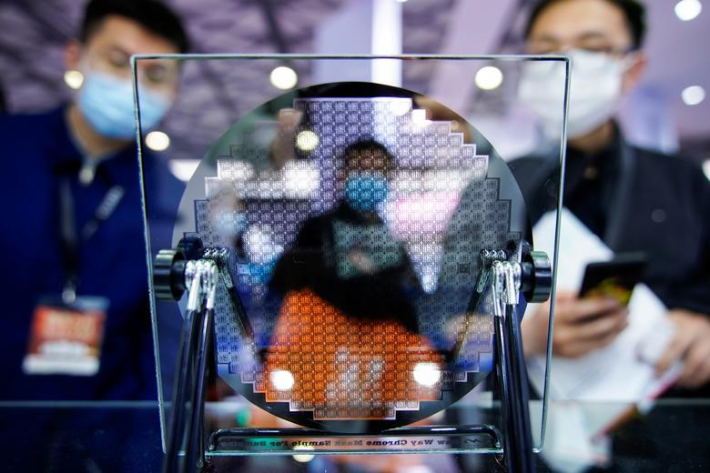The chief of one of the world’s biggest chip equipment-makers, ASML, sounded an alarm this week over the possibility of new export restrictions being implemented against China.
Speaking to Dutch television programme Nieuwsuur, ASML CEO Peter Wennink said isolating China completely will be “hopeless” and “force” the country to ramp up innovation.
“There are 1.4 billion Chinese, many of them smart. They come up with solutions that we have not yet thought of. You force them to become very innovative,” Wennink told the programme made by state-backed producers.
Also on AF: New Huawei Phone Made With ‘50% More Homegrown Chip Parts’
The Netherlands started implementing fresh chip export restrictions targeting China, from last week, a move largely seen as a response to lobbying by the United States, which is working to hobble Beijing’s military and technological capabilities.
Wennink noted he wasn’t expecting much revenue impact on ASML, Europe’s most valuable semiconductor company, from the restrictions. However, he expressed a fear that the Dutch government may implement fresh export controls, at Washington’s “insistence”.
Wennink also noted that China’s ability to innovate, and do so quickly, was already evidenced by the country’s increasing prowess in the electric vehicle (EV) market.
“In Germany they just had a big car show and they were shocked. In China things are faster, faster and more focused. We are too complacent,” Wennink told Nieuwsuur.
Developing chip industry at home
Wennink’s concerns about China’s ability to boost chipmaking at home have been echoed by multiple analysts in the US and in its ally countries.
Speaking to CNBC in June, CEO and principal analyst at research firm Futurum Group, Daniel Newman said: “I don’t underestimate China’s ability and resolve to find a way to build next generation technologies and to also utilise some lagging technologies to still build really important products.”
In South Korea, a leading legislator and former Samsung executive, Yang Hyang-ja, told the Financial Times that increasing US pressure would lead China to “provide more national support” to industries at home.
“The more the US sanctions China, the harder China will try to make rapid technological progress,” she said.
Yang’s concerns were not unfounded, evidenced by Beijing’s recent plan to pump a whopping $40 billion into developing chip industry at home.
Concerns about the authoritarian Beijing government’s determination to end its dependence on foreign technology are so widespread that SoftBank-backed Arm even cited it as a risk factor in its August filing for its $60 billion IPO in the US later this year.
The documents specifically noted Chinese President Xi Jinping’s Made in China 2025 campaign and 14th Five-Year Plan, both of which focus on semiconductors and outline an aim to develop 70% chip self-sufficiency by 2025.
Widespread concerns on chip curbs
This is not the first time that the ASML chief has voiced concerns on increasing chip-related restrictions targeting the world’s second-largest economy.
In April, Wennink noted it was “absolutely essential that we get to keep having market access to China”.
“Market access is as important to us as it is to our Chinese customers,” he said.
Wennink is also not the only chip industry leader to warn against expanding chip curbs against China. In July, executives from Intel, Qualcomm and Nvidia met with US government officials to discuss China policy and lobby against the looming threat of Washington ramping up its chip war against Beijing.
On the heels of that meeting, the United States’ most powerful semiconductor lobby group, the Semiconductor Industry Association, warned that increasing chip curbs against China could end up undermining President Joe Biden’s efforts to bolster the chip industry at home.
Also on AF: China Curbs Mean Permanent Loss of Opportunities for US, Nvidia Says
Washington media, too, has been highlighting risks associated with the US push to cut off China from global chip markets.
“If any country can overcome such a challenge, it is likely to be China,” noted the New York Times in an analysis in July, referring to widespread challenges posed by Washington’s chip sanctions.
“We’ve removed choice… Before they could choose between national resiliency and commercial motivations, and now they don’t have that choice,” Emily Kilcrease, a senior fellow at the Center for a New American Security and a former US trade official told the New York Times.
The report noted that if Beijing were to divert its $400 billion annual spends on chip imports towards domestic industries, China will “finally have the means and motivation to catch up”.
Money not enough
Despite Beijing’s ongoing efforts to pump money into building chipmaking abilities at home, analysts have also noted that state-funding alone will not be able to rescue China from US chip curbs.
Chinese experts told Reuters earlier this year that firms at home will need to innovate in the semiconductor department to have a chance at building their own capabilities.
An engineer at Shanghai Micro Electronics Equipment Group (SMEE) noted that the chip equipment-maker, launched in 2002, had no lithography experience. Its staff built their first machines by buying and studying second-hand equipment and by reading public patents and papers, the engineer said.
SMEE, the only potential Chinese rival to ASML, is expected to deliver China’s first ever home-grown 28-nanometre lithography machine later this year.
Another engineer at a Chinese memory chipmaker told Reuters that his company was not even able to get customer service on equipment it bought in the pre-sanctions era.
How far these challenges will go to impede China’s progress remains to be seen.
- By Vishakha Saxena
Also read:
China Offering Millions to Foreign-Trained Chip, Tech Talents
ASML to Ship Top Tech to China Even as Dutch Chip Ban Starts
Banned Nvidia Chips Available in China’s Underground Markets
US Chip Sanctions Have Hardly Impacted China’s AI Capability
Huawei Beats US Sanctions With Chip Tool Breakthrough
China Pulls Off Chip Breakthrough in Sanctions Blow – Telegraph
























